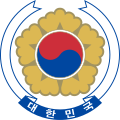This article has multiple issues. Please help improve it or discuss these issues on the talk page . (Learn how and when to remove these messages)
|
Green Party 녹색당 | |
|---|---|
 | |
| Leaders | Kim Soon-ae Lee Chi-seon |
| Founded | 2 April 2012 (Green Party) 13 October 2012 (Greens Plus) 19 April 2014 (Green Party) |
| Headquarters | Seoul |
| Membership (2016) | 10,085 [1] |
| Ideology |
|
| Political position | Left-wing [5] |
| National affiliation | Green Justice Party (2024) |
| Regional affiliation | Asia Pacific Greens Federation |
| International affiliation | Global Greens |
| Colours | Green |
| National Assembly | 0 / 300 |
| Website | |
| kgreens | |
| Korean name | |
| Hangul | 녹색당 |
|---|---|
| Hanja | 綠色黨 |
| Revised Romanization | Noksaekdang |
| McCune–Reischauer | Noksaektang |
| This article is part of a series on |
| Progressivism in South Korea |
|---|
 |
Green Party Korea is a political party in South Korea. The party was established in March 2012. It is a continuation of the Korea Greens, created following initial discussions in 2011. The party was established in response to the Fukushima Nuclear Crisis of Japan. Green Party Korea is a member of the Global Greens and the Asia Pacific Greens Federation.